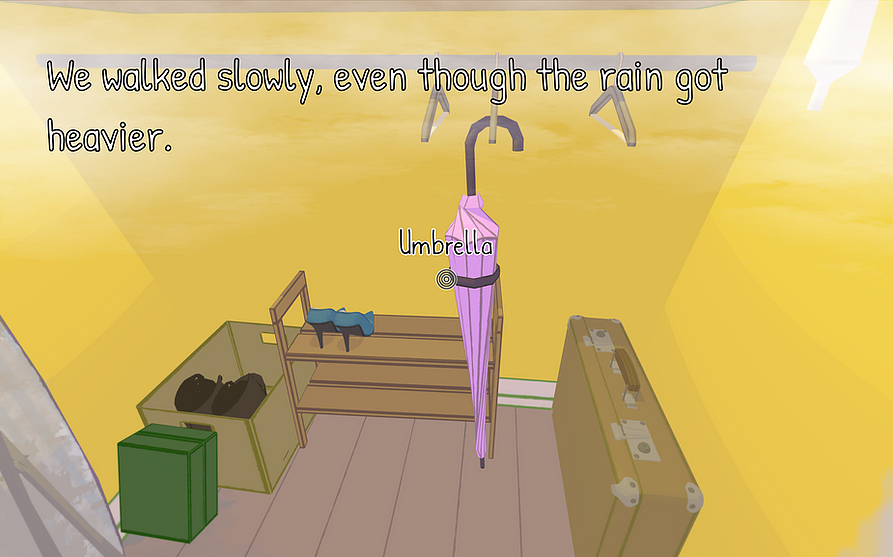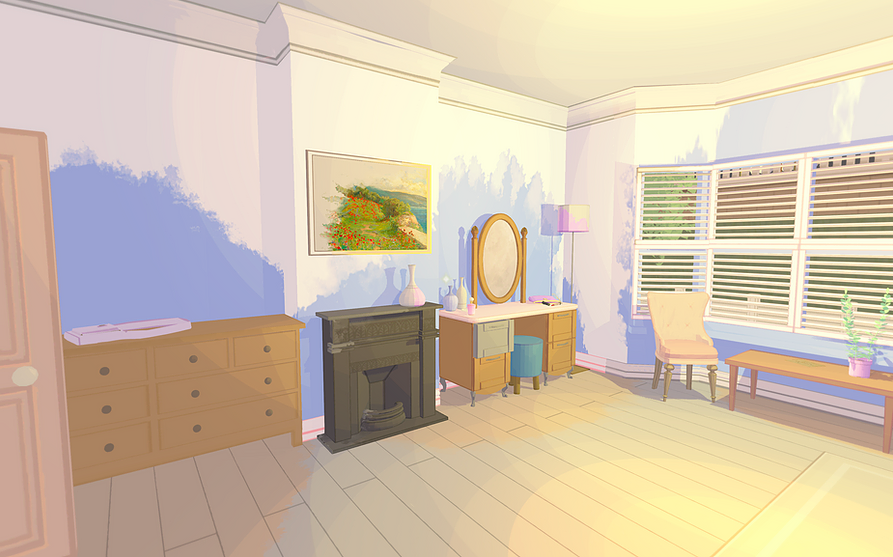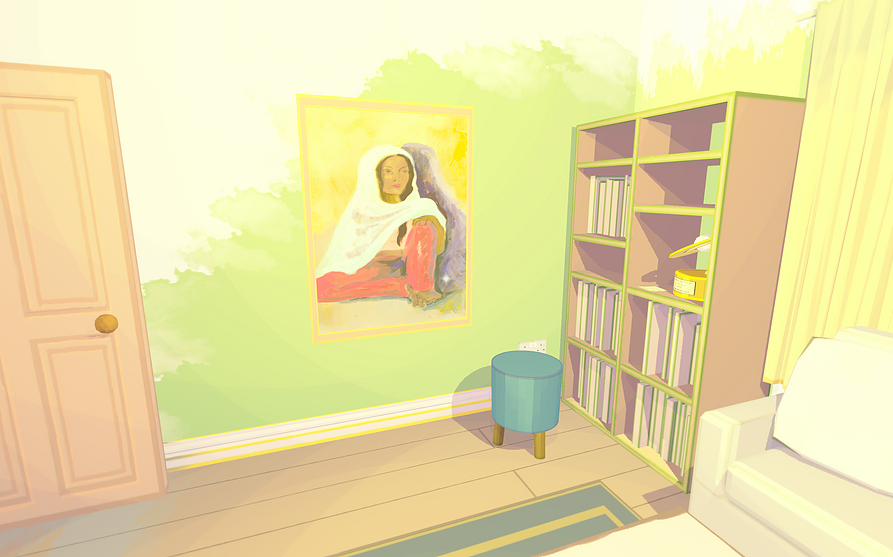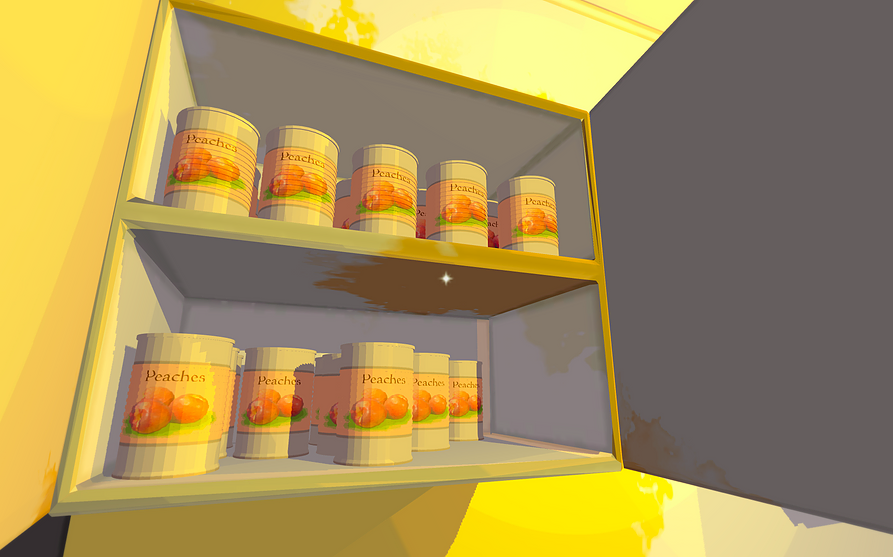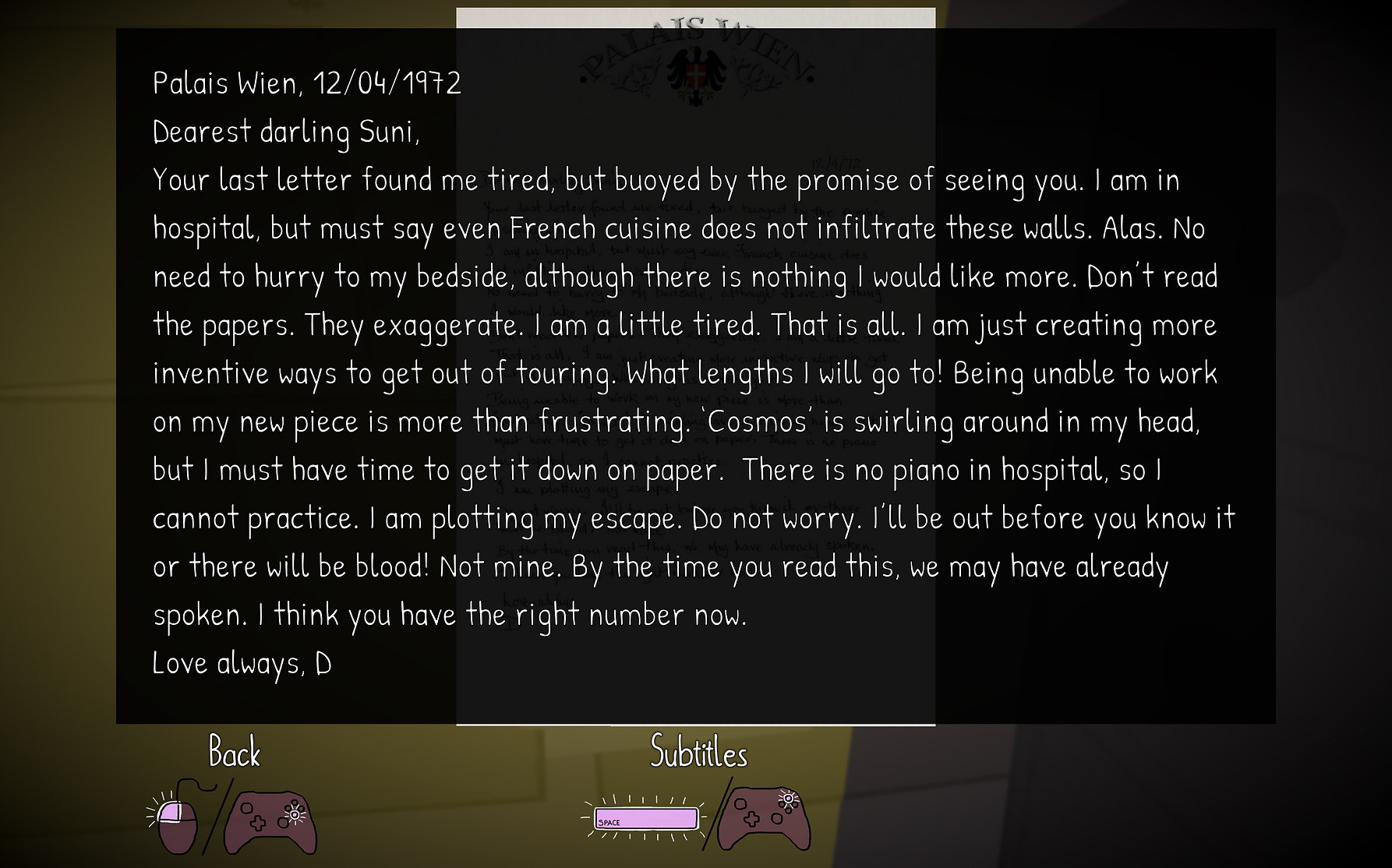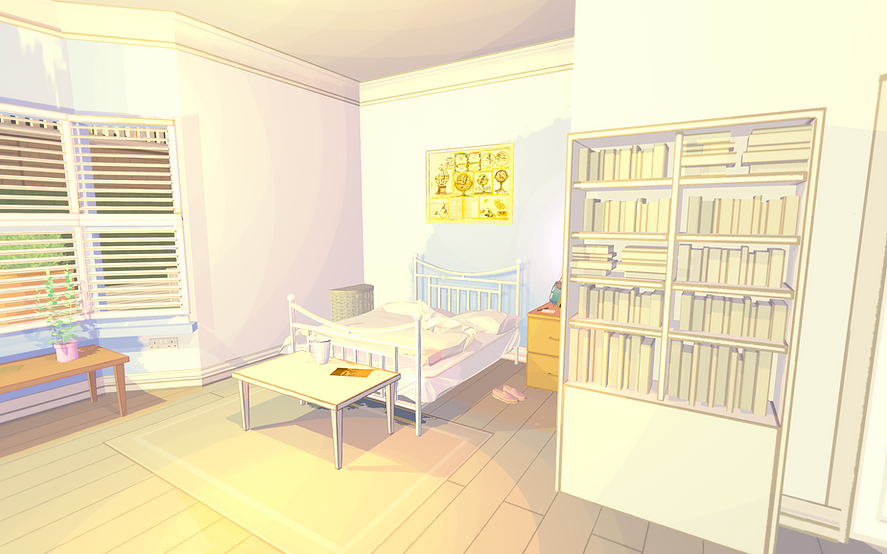
Before I Forget
Made by: 3-Fold Games
Platforms: PC/Mac
Review date:
Emoji summary: 💫📆🎹
Review by: GDLP
Spoilers: Whole story, I repeat, the whole story
My Nan lies in a hospital bed between the living room and the kitchen. She can’t get up, she can’t do much at all. She has Alzheimer’s and it is undiagnosed for reasons beyond me, but we saw it in my Granddad and now we see it in her too. To be fair, it might not even be dementia, it might just be that her head is blurry from the sepsis that arrives every now and again in her body with the seasons - we don’t know. Just, sometimes she speaks to things in the room that we cannot see. Her sentences don’t run on like they used to. She thinks my cousin’s babies are my auntie’s; she sometimes thinks I am my mum. Her sense of time is vague. It goes in, out and back again, and I bought a special clock to spell it out but she doesn’t pay it any attention. Maybe that’s how she likes to be, untethered from all chronology; her sleep schedule is flipped and she watches daytime TV repeats in the middle of the night alone.
I lived with my Nan and my uncle from last September until the end of June, right through lockdown, until it was time for me to move out. I felt bad but I needed to go back to work and I didn’t want to risk bringing the virus back into the house after being careful for all these months. I also hadn’t seen my boyfriend for 116 days, and the strange, recent success of our little website meant I could finally afford to make rent outside of family homes, so I took it. A friend of a friend had an Airbnb that hadn’t made them any money in months - wasn’t likely to any time soon either - and they decided to find a tenant who ended up being me. I’ve been here with the big windows and trees and peace for 2 months and 2 days, unfolding, growing, paying bills, and feeling like a new person in my happiness. But I felt guilty when I left and I still feel something close to that now because I have only walked the half an hour back to my Nan’s house once since leaving. I’ve been doing the thing that non-sick people do all too often. I’ve avoided taking the time to honour her - until now. I played a 1 hour computer game this morning that was like a slight hand on my lower back ushering me gently towards all these feelings. I’m going to walk to her tomorrow and say hello through the double-glazing in the back garden, even if I can’t stay as long as I’d like to under all of this rain. Yesterday, we had one of the heaviest rainfalls recorded in Liverpool but I will just remember to bring an umbrella.
‘Before I Forget’ was made by 3-Fold Games, ‘a micro game studio of two women, Chella Ramanan and Claire Morwood.’ They are based in Bristol. The game is available for just a few pounds on Mac and PC, and after I’d finished my breakfast, I sat down to load it up. You play Sunita in her flat in north London alone. It involves moving from room to room, checking out the things around us, reading bits and hearing Sunita’s internal monologue as we go. In doing this, it does not take long to piece together the small story of this game while her thoughts drift, stop, stutter, and her mood flashes over and over again. She’s wondering a lot of things. Like, there are photos of her and Dylan on the wall but where is he and when will he get home? There’s an award on the shelf for her work in science - literally has her name on it - but she says, ‘wow, that sounds impressive. But I don’t think it was me.’ There’s even a magazine cover story celebrating her work in cosmology; maps of skies framed and hanging around the place. She drifts off in her head remembering being young and her auntie recounting the mythologies behind constellations she would come to know so well. And she enjoys these memories, but then suddenly she’s distressed and a little bored, impatient. There are post-it notes in almost every room that confuse her. ‘Find Dylan.’ ‘Gas bill overdue. We’ll sort it together.’ In the kitchen there’s a big note underlined and telling her not to use the stove, that lunch is waiting in the fridge. When she sees the plain cheese butty on a plate, she says that cheese in bland, she doesn’t want it, and actually she can decide what she’s having for lunch herself.
Very soon after starting the game, someone called Maria rings from the care agency and leaves a voicemail to say she’ll be round soon. There’s an old email on the computer wishing Sunita the best for retirement and for 'managing her condition.’ And there’s a raw moment of panic when she needs to go to the toilet but every door you open in the hallway leads back to the tiny closet by the front door, and Sunita wets herself where she stands. She has early-onset dementia and now her life has shrunk down from the stars to this flat, to a different space entirely.
‘Before I Forget’ isn’t dramatic or didactic in how it wants you to feel. It exists, time ticks slow, the sky flies over us, and the game’s aesthetic sits in this puddle sadly like when you overwater a plant and its roots can’t breathe for a second - and I think that’s appropriate. I wanted to write about it because of the things it has allowed me to process, but also to commend its makers on the subtle moments between design, art and writing that were so well-researched. I was constantly finding these footholds of pure familiarity as I played through the hour, and that was special. For example, at first, the setting we move through is muted and non-specific. The rooms are drained of colour and texture and it’s almost as though the player, from a first person camera perspective, is navigating a generic digital model of a flat populated with default shapes: there are blank books on the shelves, label-less tins in the cupboard, white walls and an empty picture frame above a fireplace that isn’t lit. But when we interact with the various items around the flat, soft watery tones pour outwards and colour in the shape as well as its surroundings. It reminded of how I used to feed my Nan because she would forget that there was food in front of her and it’d get cold. I’d give her a prompt to look at it and she’d take a bite, but then she’d look back up at the TV and it would disappear until the next time I brought it back up, like I was her personal magician. It used to make me laugh a little bit because it seemed silly, and I guess people meme object permanence all the time. But it wasn’t funny for long. Sometimes the buttons would fall under her sheets and she would accidentally change the input on the telly, turn it off completely or mute it, and she never thought to look for them because they weren’t directly in front of her. I’d come down in the morning to find she’d been staring at a blue screen, a black screen or silent films all through her sleepless night and I would feel so sad. There is something very careful about how detail comes in through acknowledgment, like focus itself is a sort of world-building; and when something isn’t being looked at it, it becomes nothing at all. The game even begins with us moving Sunita forward to reach for her glasses; everything starts with a blur. There’s no London traffic zooming past but maybe that’s because she’s not stood looking out the window so for now, her London is quiet and still. That scaling makes a lot of sense.
There’s another line in the game I want to mention as well, one that feels like a sore crease in paper in the way it stays hard while the story unfolds. We can hear a light piano playing and Sunita comments that it must be Dylan doing a song in the other room. From paraphernalia including flyers, vinyls, and letters on hotel stationary, we learn that Dylan is a renowned pianist who tours the world. In love, married, they had a little trouble at one point over him wanting a baby and her not being so sure anymore; but as we remember further into their lives, we actually learn from newspaper clippings that Dylan was in a car accident. It cannot be him in the back room playing on his piano because he isn’t with us anymore, he isn’t with Sunita. The sound is in her head; and for us it is the soundtrack to the game. It seems like she has to reconcile with this fact all the time, today and again tomorrow. She was so used to him being away for performances that she has now settled into this eternal, misplaced present tense where she thinks he is still somewhere playing and it won’t be too long before he’s back. That one comment about him playing piano in the other room is still something I am thinking about now. It’s nearly 2 years since my Granddad died and my Nan used to know this. She saw him in a coffin in the house - in the room she sleeps in now - and we managed to get a wheelchair for the day to bring her out to the funeral. But that’s when she started to lose her grip on things, like heartbreak in her head. And now she thinks he’s upstairs, or he’s gone the shop for some milk. To be fair, this is all he ever did. He was a milkman for years and then in retirement, he would use his free bus pass to travel 40 minutes to and from a Morrison’s in the middle of nowhere because the milk was 20p cheaper. I guess it’s a lot easier to believe that someone’s in another room than another life. Sometimes I would walk into my Nan’s room and she’d tell me someone else was in there. I specifically remember once asking ‘where’ and she pointed to a little fold in her blanket. Me and my uncle thought it was kind of nice that even when we weren’t in the room, she made people up so that she didn’t feel alone.
Small quiet thing haunted by the loving dead. It is like this until the game enters its final sequence in a rush of endless corridors and glowing red lights, before we step out into a faded garden with rain droplets suspended in mid-air and Dylan’s silhouette in the distance waiting for us below an umbrella. It’s cinematic but it also isn’t, because we haven’t just watched Sunita, we’ve played her life - we’ve been something between herself and her carer for an hour. There’s a quote in Alexander Galloway’s ‘Gaming’ that says, ‘where film uses the subjective shot to represent a problem with identification, games use the subjective shot to create identification. While film has thus far used the subjective shot as a corrective to break through and destroy certain stabilising elements in the film apparatus, games use the subjective shot to facilitate an active subject position that enables and facilitates the gamic apparatus.’ I’m glad I took a little time to play this - and I’m glad I went to see my Nan the next day. It was 5pm and she was watching QVC but told me it was ‘This Morning,’ and I did not correct her. She asked me for a cream slice and I came back after work a few days later to drop it off through the window before she quickly fell back asleep and I walked up the hill back home. I’ll be back down soon.
You can find the game on steam here. it's 5.99!
If you’re here at the end of the text, please comment a calendar 📆 emoji on our Instagram or share the text with a calendar 📆 emoji on Twitter
